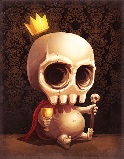|
A warship. Hm.
|
|
|
|

|
| # ? May 21, 2024 07:31 |
|
Mel Mudkiper posted:I feel like there is something of an elephant in the room about trying to be distantly critical of baru corumant General Battuta does seem like a genuinly decent guy, but that's true regardless of whether his book is good or bad
|
|
|
|
I think Battuta is a monster and a wretch, unfit to be looked upon by human eyes.
|
|
|
|
Crimpolioni posted:General Battuta does seem like a genuinly decent guy, but that's true regardless of whether his book is good or bad Sure but we cannot presume objective distance when we clearly cannot have it
|
|
|
|
Mel Mudkiper posted:I feel like there is something of an elephant in the room about trying to be distantly critical of baru corumant I don't see why you need to mock his weight problems.
|
|
|
|
Why would anyone read a book with the words "Baru Cormorant" on the cover?
|
|
|
|
Cause its a cool rear end name.
|
|
|
|
pospysyl posted:Why would anyone read a book with the words "Baru Cormorant" on the cover? what if it's a charming children's book about the adventures of a medium-to-large aquatic bird, with body weight in the range of 0.35–5 kilograms (0.77–11.02 lb) and wing span of 45–100 centimetres (18–39 in) called Baru?
|
|
|
|
That's Baru Livingstone Seagull.
|
|
|
|
Crimpolioni posted:The author did a kinda thing where he read his own book and talked about his though process that prolly answers some of your questions. https://www.sethdickinson.com/2015/10/01/the-traitor-baru-cormorant-read-along-chapter-1/ This may be the wrong thing to take away from the readthrough, but reading that makes me think that he utterly failed to convey his ideas through the medium of the text. -Notably throughout the readthrough there are no actual reasons given for why anyone would want to join the Masquerade. The closest given is that the 5 LARPers have a plan to prevent the cycle of societal decay by controlling all the variables...but that's not something that keeps common people awake at night. The blog mentions that Parliament actually answers to voters, but if voting on parliamentarians instead of dealing with hereditary nobility was actually part of the appeal of the Masquerade it would make them something one could see joining. -The mask motif, something I was going to discuss before I realized it was 2am, is apparently about how it is bad to judge people without considering their identities ( -The entire homosexuality thing is apparently NOT settled law but is up for debate among the 5 LARPers, a conflict which is never shown in the book. Masquerade law and doctrines are depicted as immutable.in the book but APPARENTLY there is a secret Masquerade gay rights movement which is never mentioned in the book. -The entire field of social psychology, which the book is based on, is currently undergoing a MASSIVE reproducibility crisis (https://www.washingtonpost.com/news...m=.ced8a77b5d99) in which cornerstones of psychology such as the Zimbardo prison experiment are being debunked. -Is the Falcresti revolution a recent or ancient thing? If recent where are the fanatics decrying the old regime and espousing the new philosophy? If ancient what does this empire provide for the masses to aspire to? Even 1984 had the love of Big Brother and the hatred of Emmanuel Goldstein and a war to justify its existence. -This is a book about sexism despite not actually having any sexism in it. Seriously, no one gives Baru poo poo for being a woman (as much as for being young and inexperienced, and that's like 1 guy), the Imperial Justice is a woman, women are officers in the Masquerade navy (despite the blog telling us that ACTUALLY the admirals we never see are really super sexist) and no one objects that a woman is joining the 5 LARPers. The Audwynners don't seem to give a poo poo about their figurehead being a woman and indeed have women in ducal positions. The one time Baru intervenes to protect her cousin from being molested the Imperial Navy actually shows up and makes the guy gently caress off. -Apparently the book deals with racism...somehow? Aside from mentioning people's skin colors briefly and having a breeding program there doesn't seem to be a whole lot of making black people sit at the back of the bus. On my readthrough I was under the impression that they were controlling breeding less to keep a particular skin color and more to create super-soldiers because - spoiler alert - the programs end up creating a small force of super-soldiers. Baru is apparently a target of racial discrimination but is not only accepted as the Imperial Accountant but raised to the rank of LARPer. *My original take on the masks where that they didn't particularly work very well. They were the motif of the empire, not the characters, yet the empire was very open in what it was trying to do. Even things such as the learned helplessness betrayal schtick were heavily foreshadowed by the prisoner story and Purity Cartone (a eugenics bred super soldier) acknowledging Baru as a servant of the throne. It would have been appropriate for an empire putting on a benevolent front, but the first thing we see the Masquerade do is steal all the Taranoke peoples' money to replace it with worthless fiat currency and murder a gay dude. Their intended symbolism as showing how wrong it is to judge people based on merit instead of identity is, uh... TL;DR: If you read a whole bunch of poo poo that was never put into the book it actually addresses these Very Important Issues, while also there's a bunch more context that could have been put into the book but wasn't.
|
|
|
|
|
lol
|
|
|
|
My impression is that everything was ultimately up for debate among the LARPers, and we don't see them debating things because Baru doesn't know their secrets. Since Baru becomes one of them at the end, we'll presumably see more of their discussions (and the culture of Falcrest, for that matter) in the sequel. (I'm not expressing an opinion either way about the rest of TheGreatEvilKing's points because I don't feel like reading General Battuta's commentary.)
|
|
|
|
pospysyl posted:Why would anyone read a book with the words "Baru Cormorant" on the cover? It was a bit refreshing to see compared to the usual fantasy titles etc. Was a disappointed when Baru was removed for the UK.
|
|
|
|

|
|
|
|
lol
|
|
|
|
I'm the coyly peeping arc of scrote.
|
|
|
|
TheGreatEvilKing posted:So I just finished The Traitor Baru Cormorant, and while overall I liked it I think I'm going to submit it to the mercies of this thread. It is approaching 1am, but I am not particularly desirous of sleep, so here is my unwanted hot take. There will be spoilers. This is like the fantasy genre writing equivalent of critique.
|
|
|
Seldom Posts posted:This is like the fantasy genre writing equivalent of critique. It's a 1 am ragepost on a comedy forum, what more do you want from me?
|
|
|
|
|
sluts
|
|
|
|
TheGreatEvilKing posted:It's a 1 am ragepost on a comedy forum, what more do you want from me?
|
|
|
|
Honestly? I couldn't find the original strip at 1 am, and I had to work the next day. I didn't even redraw it lol, it was the first result on google for "eatazeeb corporation"
|
|
|
|
|
The Bad Faith of the Illuminatorquote:The Sultan: The curtain opens on a typical everyday torture chamber. Yosrick, the young apprentice, sings of his joy in his job. - The Adventures of Baron Munchausen (1988) When one reads the extremely dense Shadow of the Torturer, one is not reminded of literature but of cinema: specifically, Park Chan-wook’s 2003 neo-noir fantasy film and overrated festival circuit darling Oldboy. Intelligent viewers will understand that the movie’s strength lies cunningly taut editing. Any filler or potential dead space eliminated, scenes blend into each other with strange ease, but the pacing is so relaxed that the abruptness of the scene transitions is never too jarring. To use a phrase dangerously close to a cliché, the movie operate on the logic of dreams. To use a phrase nowhere near to a cliché, the movie operates by the logic of intoxication, which is why the protagonist is introduced as a confused drunk. The movie’s narrative provides a constant stream of strange revelations and of developments whose cause and effect is obscured or oblique. But Park does not interrogate the nature of fantasy, and the effect only accentuates pulp sadism. The audience is mesmerized into a state of passive uneasiness and low awareness, like the movie’s hero, holding their breath in anticipation of violence. Consequently, they experience and learn nothing of interest. Oldboy is just an exercise in slick sadism, as is extremely dense Shadow of the Torturer. Gene Wolfe’s first in entry in the extremely dense Book of the New Sun quartet/quintet/racket introduces us to another “dying Earth,” a type of pulp fantasy/sci-fi setting where decay and ramshackle tradition rule during an apocalypse so slow that most people have had to get used to it. Severian is an initiate in the torturer’s guild, a satirical device that in Wolfe’s hands always fails to get a laugh. The novel charts his years as an apprentice, journeyman, and as an exile, surrounded by portents, vague factions, and supernatural manipulations. The singular strength of Wolfe’s writing in The Shadow of the Torturer is the hypnotic pacing of his prose, the strange ease with which sentences and scenes meld into each other. quote:"You came for pleasure, did you not? If a dream adds to your enjoyment, why dispute it?" All this time the girl with the golden hair continued her slow, unaccompanied dance. Severian, as narrator, prefers not to inquire or speculate after the bizarre and the unusual, but instead accepts these developments passively even as greater forces seem to make themselves known. This engenders nervous stupefaction and expectation in the reader, who is torn between curiosity and placid acceptance. Thus no excerpt suffices to properly display the extremely dense prose of The Shadow of the Torturer, for it would have to be impossibly long to capture its pace. Thus quotations appear unrepresentative of the extremely dense novel even when they are all too revealing of Wolfe’s skills as a prose stylist. His prose might be backhandedly praised as “readable”. Being readable is a desirable quality for any work of writing, but if a book is praised for it, there is probably little else to it. Seek no further than the metafictional “translator’s notes” for proof: nobles cannot be nobles but exultants, knights cannot be knights but armigers, the bourgeoisie must be optimates, and so on. Conversely, common words may disguise alien concepts. For Wolfe extremely dense vocabulary is a substitute for craftsmanship. Gallicisms, Latinate, and Greek are peppered throughout to spice up amateurish Anglo-Saxon: quote:When it seemed that it must soon be day, I saw upon the broad, black ribbon of the river a line of sparks that were not the lights of vessels but fixed fires stretching from bank to bank. It was a bridge, and after tramping long through the dark I reached it. Leaving the lapping tongues of the river, I mounted a flight of broken steps from the Water Way to the more elevated street of the bridge, and at once found myself an actor in a new scene. The bridge was as well lighted as the Water Way had been shadowed. There were flambeaux on staggering poles every ten strides or so, and at intervals of about a hundred strides, bartizans whose guardroom windows glared like fireworks clung to the bridge piers. Carriages with lanterns rattled along, and most of the people who thronged the walkway were accompanied by linkboys or carried lights themselves. There were vendors who shouted the wares they displayed in trays hung from their necks, externs who gabbled in rude tongues, and beggars who showed their sores, feigned to play flageolets and ophicleides, and pinched their children to make them weep. Wolfe always writes incompletely. The scene above is defined by fire-light, but does almost nothing to describe effects or qualities of light. We understand that the bridge is well-lit, but the light of fires and torches is vibrant and inconsistent. Consider how Wolfe is describing what should be a chiaroscuro scene of urban night-life, yet nowhere do we read of the play of light and shadow on the grotesque extremes of ostentation and poverty. The tableau is static. And where Wolfe ventures to describe the qualities of light, he is erroneous: his windows glare like fireworks, but fireworks do not glare. They burst, sparkle, and dissipate. Such abuses of English are common in extremely dense Shadow of the Torturer. The monotony of Wolfe’s prose is as clear here as it is everywhere else. Consider the first sentence: “When it seemed that it must soon be day, I saw upon the broad, black ribbon of the river a line of sparks that were not the lights of vessels but fixed fires stretching from bank to bank”. We do not read that Severian observed this “at daybreak,” but “when it seemed that it must soon be day”. We do not read that there was “a line of sparks,” but of “a line of sparks that were not the lights of vessels”. The monosyllabic evenness lends the sentence a breathless quality, which affixes the reader from beginning to end. But to follow such an effort with a phrase as utterly drab as “it was a bridge” puts the lie to any claim that Wolfe’s prose is remarkable. Evenness is the watch-word for the extremely dense Shadow of the Torturer. The prose is stretched and rounded out so as to be read as a single invocation. The more unusual vocabulary might be imagined as ritual Latinisms in an otherwise vernacular Mass. But Wolfe’s prose cannot affect the psychology of faith, for there is no sorrow, joy, supplication, or ecstasy in Wolfe’s droning. This monotony is occasionally quickened, but not broken, when sentences run on to suggest rising emotional pitch: quote:I had known, as all the apprentices knew, that one was not firmly and finally a member of the guild until one consented as an adult to the connection. Furthermore, though I loved the guild I hated it too - not because of the pain it inflicted on clients who must sometimes have been innocent, and who must often have been punished beyond anything that could be justified by their offences; but because it seemed to me inefficient and ineffectual, serving a power that was not only ineffectual but remote. I do not know how better to express my feelings about it than by saying that I hated it for starving and humiliating me and loved it because it was my home, hated and loved it because it was the exemplar of old things, because it was weak, and because it seemed indestructible. quote:I started to ask how it was possible for the House Absolute (which I had always imagined a vast palace of gleaming towers and domed halls) to be invisible; but Thecla was already thinking of something else altogether, stroking a bracelet formed like a kraken, a kraken whose tentacles wrapped the white flesh of her arm; its eyes were cabochon emeralds. quote:The Adamnian Steps wind back and forth across a long hillside, and they are a favored place for strollers, who often hire a ride to the top and descend. I saw many couples finely dressed, men with the marks of old difficulties scarring their faces, and romping children. Saddening me more, I saw too from several points the dark towers of the Citadel on the opposite bank, and on the second or third such sighting it came to me that when I had swum from the eastern bank, diving from the water-stairs and fighting with the tenement children, I had once or twice noticed this narrow line of white on the other shore, so far upstream as to be nearly beyond sight. These outpourings remain as mechanically wearisome, because they merely give an impression of agitation rather than the real thing. Wolfe’s extremely dense prose is as cold and inert as his dying sun. If one points to such flaws, Wolfe’s fans are wont to argue that its very badness is proof of his genius, for only he could have conceived such a convincing impression of a writer as bad as Severian. This can be dismissed firstly because these are the same fans who will argue that Wolfe’s prose is masterful, and thus they are loving liars. And secondly, while Severian undeniably writes badly, he fails as such a character, for Severian is not a character at all. Bad writers have depth to their awfulness, but Severian has no distinguishable voice or personality, let alone that of a bad writer. He does not represent any discernible human type or experience. He consists simply four tones of narration: modestly assertive, obsequiously self-denying, sharply observant, and philosophically musing. No doubt fans will next argue that bad characterization is proof of Wolfe’s genius, for it shows how the vague powers that guide Severian have molded him into a literary nonentity. One wonders if the fanboy theorists have solved the mystery of why so many women throw themselves at him. And thirdly, according to the novel's metafictional device, the text is a translation: the blame may be squarely be laid on the incompetence of the translator-author. Severian represents a fantasy that is familiar from later genre hacks: of being mocked and maltreated by the universe while remaining the centre of said universe. It is one of the wonders of genre literature that Cugel the Clever, the monstrously selfish anti-hero from Jack Vance’s dying Earth, comes off as less fundamentally egoistic than someone as vacuous as Severian. Cugel at least seems interested in the world and the people around him, even if it is merely for his own advantage. Severian has nothing to him, and from the first chapter we know that he shall be the ruler of his nation. Subsequent novels further underline his importance. The torturer’s apprentice is the precursor of FitzChivarly Farseer and Kvothe the Kingkiller, self-pitying narrator-heroes without personality, whose misfortunes appear as validation of their central role in the grand scheme of things. Wolfe is a child playing with toys compared to Samuel Beckett, who in his trilogy of Molloy, Malone Dies, and The Unnamable charted new continents of existential incomprehension and suffering. There only remains Wolfe’s puzzle-plot remains for disposal. Fans have through the years taken up the task of deciphering the extremely dense narrative of The Book of the New Sun in a poor imitation of scholarship. These fans no doubt object to claims that Wolfe bamboozles the reader, as his puzzle-plot is a device to develop and educate readers in the understanding of texts. But this is a misunderstanding of the act of reading and the value of literacy. The Book of the New Sun leads the reader to try to discover the truth beyond Severian’s words, for he does not understand his story, but this is an anti-literary exercise. To try to discover what lies “beneath” the surface of the text is to declare the text itself secondary and irrelevant, what Barthes warned against in “The Death of the Author”. The pleasure of literature is not in what lies beneath its surface, but in the surface itself. If the true story of The Book of the New Sun are the intrigues peered between Severian’s words, then Severian’s words – the prose - are ultimately an obstacle to be overcome. If the goal for the reader is to reject the text as flawed, one will do just as well by not reading it in the first place. Wolfe does not teach readers to understand texts, but to understand a text. The skills necessary to disentangle the extremely dense plot of The Book of the New Sun do not translate into understanding of other literary works. These skills are applicable merely to deciphering the plot content of one series, which might superficially resemble an intellectual activity, but is really only a laborious one. This is the ultimate failure of the puzzle-plot: it is an exercise in complexity rather than in nuance. The artistic, educational, and intellectual value of Wolfe’s work can be perfectly replicated by watching Dark Souls “lore” videos on YouTube. They’re about as dense. BravestOfTheLamps fucked around with this message at 09:11 on Feb 8, 2019 |
|
|
|
Oh this should be fun
|
|
|
|
Your English is normally a lot better. Getting a real Piero Scaruffi vibe from this post.
|
|
|
|
I wish I could do a find-replace on every irritating fantasy measurement. Strides, man-heights, armspans, a hundred heartbeats, tendays, twodays, tenyear. They always feel like a lazy affection. Its like said-bookism, but for the metric system.
|
|
|
|
dickspans
|
|
|
|
Strom Cuzewon posted:I wish I could do a find-replace on every irritating fantasy measurement. Strides, man-heights, armspans, a hundred heartbeats, tendays, twodays, tenyear. They always feel like a lazy affection. Its like said-bookism, but for the metric system. my favorite poo poo is when they want to be all fantasy but just use really obvious replacements for our thing like the days of the week in Elder Scrolls Morndas. Tirdas. Middas. Turdas. Fredas. Loredas. Sundas.
|
|
|
|
Mel Mudkiper posted:Turdas. Sham bam bamina! fucked around with this message at 20:19 on Oct 31, 2018 |
|
|
|
Mods please change my name to TURDAS TUESDAY
|
|
|
|
the fool laughs at turd rear end the wiseman laughs at lard rear end
|
|
|
|
I remember I wrote a fantasy story as a teenager about a guy named Jake doing something on a Tuesday in July in a mystical fantasy land because even then I knew fake fantasy names were stupid
|
|
|
|
one last post but i just want to take issue with this partBravestOfTheLamps posted:His prose might be backhandedly praised as "readable"
|
|
|
|
BravestOfTheLamps posted:The Bad Faith of the Illuminator The one thing I wanted to know from this review is whether the book was dense and if so to what degree, but alas you never gave an indication one way or the other.
|
|
|
|
Mel Mudkiper posted:my favorite poo poo is when they want to be all fantasy but just use really obvious replacements for our thing What do they have against saturdays?
|
|
|
|
Datass.
|
|
|
|
But how will you know it's fantasy if it has prosaic names for everyday things?!
|
|
|
|
|
Measurements I can deal with, but fantasy curse words always make me cringe. There's almost always some variation of (Deity)(verb)my(noun).
|
|
|
|
BravestOfTheLamps posted:
Unlike the characters from the later genre hacks Severian is supposed to be this universe's Christ, so of course he would be the center of the universe.
|
|
|
|
Spoilers, dick!!
|
|
|
|

|
| # ? May 21, 2024 07:31 |
|
Sham bam bamina! posted:Spoilers, turdass!!
|
|
|























